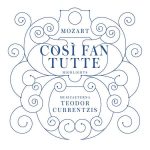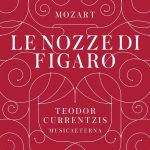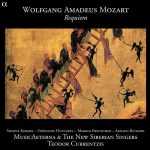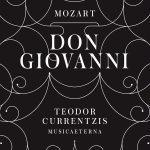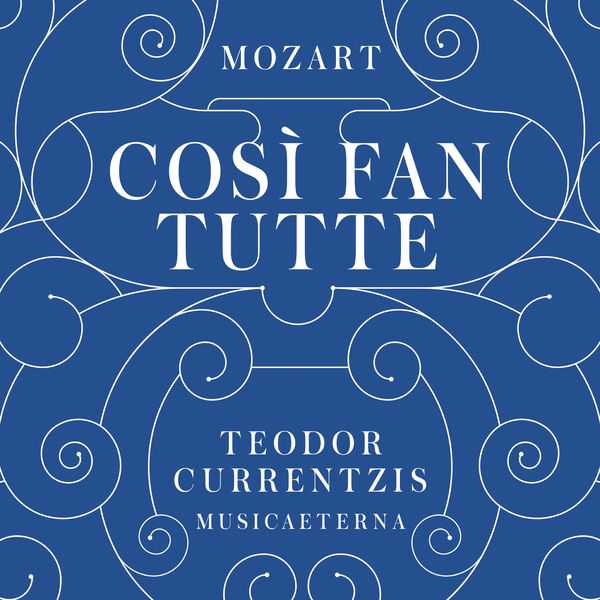

Composer: Wolfgang Amadeus Mozart
Performer: Simone Kermes, Christopher Maltman, Malena Ernman, Kenneth Tarver, Konstantin Wolff, Anna Kasyan
Orchestra: musicAeterna
Conductor: Teodor Currentzis
Number of Discs: 3
Format: FLAC (tracks)
Label: Sony
Catalogue: 88843095832
Release: 2017
Size: 4.95 MB
Recovery: +3%
Scan: cover
Così fan tutte ossia La scuola degli amanti, K. 588
CD 01
01. Ouvertura
Atto Primo
02. La mia Dorabella capace non è (No. 1, Terzetto: Ferrando, Don Alfonso, Guglielmo)
03. Fuor la spada (Recitativo: Guglielmo, Don Alfonso, Ferrando)
04. È la fede delle femmine (No. 2, Terzetto: Ferrando, Don Alfonso, Guglielmo)
05. Scioccherie di poeti! (Recitativo: Ferrando, Guglielmo, Don Alfonso)
06. Una bella serenata (No. 3, Terzetto: Ferrando, Don Alfonso, Guglielmo)
07. Ah guarda, sorella (No. 4, Duetto: Fiordiligi, Dorabella)
08. Mi par che stamattina (Recitativo: Fiordiligi, Dorabella, Don Alfonso)
09. Vorrei dir, e cor non ho (No. 5, Aria: Don Alfonso)
10. Stelle! Per carità, signor Alfonso (Recitativo: Fiordiligi, Don Alfonso, Dorabella)
11. Sento oddio, che questo piede (No. 6, Quintetto: Fiordiligi, Dorabella, Ferrando, Guglielmo, Don Alfonso)
12. Non piangere, idol mio (Recitativo: Guglielmo, Ferrando, Don Alfonso, Fiordiligi, Dorabella)
13. Al fato dàn legge (No. 7, Duettino: Ferrando, Guglielmo)
14. La commedia è graziosa (Recitativo: Don Alfonso, Ferrando, Fiordiligi, Dorabella)
15. Bella vita militar! (No. 8, Coro)
16. Non v’è più tempo, amici (Recitativo: Don Alfonso, Fiordiligi, Dorabella, Ferrando, Guglielmo)
17. Di scrivermi ogni giorno (Recitativo: Fiordiligi, Dorabella, Ferrando, Guglielmo, Don Alfonso)
18. Bella vita militar! (No. 9, Coro)
19. Dove son? Son partiti (Recitativo: Dorabella, Don Alfonso, Fiordiligi)
20. Soave sia il vento (No. 10, Terzettino: Fiordiligi, Dorabella, Don Alfonso)
21. Non son cattivo comico! – Nel mare solca (Recitativo: Don Alfonso)
22. Che vita maledetta … Madame, ecco la vostra colazione (Recitativo: Despina, Fiordiligi, Dorabella)
23. Ah scostati (Recitativo: Dorabella)
24. Smanie implacabili che m’agitate (No. 11, Aria: Dorabella)
25. Signora Dorabella, signora Fiordiligi (Recitativo: Despina, Dorabella, Fiordiligi)
26. In uomini! In soldati (No. 12, Aria: Despina)
27. Che silenzio! Che aspetto di tristezza (Recitativo: Don Alfonso, Despina)
28. Alla bella Despinetta (No. 13, Sestetto: Fiordiligi, Dorabella, Despina, Ferrando, Don Alfonso, Guglielmo)
29. Che sussurro! Che strepito (Recitativo: Don Alfonso, Dorabella, Fiordiligi, Ferrando, Guglielmo, Despina)
30. Come scoglio immoto resta (No. 14, Aria: Fiordiligi)
CD 02
Atto Primo
01. Ah non partite! (Recitativo: Ferrando, Guglielmo, Don Alfonso, Dorabella, Fiordiligi)
02. Non siate ritrosi (No. 15, Aria: Guglielmo)
03. E voi ridete? (No. 16, Terzetto: Ferrando, Guglielmo, Don Alfonso)
04. Si può sapere un poco (Recitativo: Don Alfonso, Guglielmo, Ferrando)
05. Un’aura amorosa (No. 17, Aria: Ferrando)
06. Oh la saria da ridere (Recitativo: Don Alfonso, Despina)
07. Ah che tutta in un momento (No. 18, Finale: Fiordiligi, Dorabella)
08. Si mora sì, si mora (Ferrando, Don Alfonso, Guglielmo, Fiordiligi, Dorabella)
09. Giacché a morir vicini (Don Alfonso, Fiordiligi, Dorabella, Despina, Ferrando, Guglielmo)
10. Eccovi il medico (Don Alfonso, Ferrando, Guglielmo, Despina, Fiordiligi, Dorabella)
11. Dove son! Che loco è questo! (Don Alfonso, Ferrando, Guglielmo, Despina, Fiordiligi, Dorabella)
12. Dammi un bacio, o mio tesoro (Don Alfonso, Ferrando, Guglielmo, Despina, Fiordiligi, Dorabella)
Atto Secondo
13. Andate là, che siete (Recitativo: Despina, Fiordiligi, Dorabella)
14. Una donna a quindici anni (No. 19, Aria: Despina)
15. Sorella, cosa dici? (Recitativo: Fiordiligi, Dorabella)
16. Prenderò quel brunettino (No. 20, Duetto: Fiordiligi, Dorabella)
17. Ah correte al giardino (Recitativo: Don Alfonso, Dorabella)
18. Secondate, aurette amiche (No. 21, Duetto con Coro: Ferrando, Guglielmo)
19. II tutto deponete (Recitativo: Don Alfonso, Fiordiligi, Dorabella, Despina, Ferrando, Guglielmo)
20. La mano a me date (No. 22: Despina, Ferrando, Guglielmo, Don Alfonso)
21. Oh che bella giornata! (Recitativo: Fiordiligi, Ferrando, Dorabella, Guglielmo)
22. Il core vi dono (No. 23, Duetto: Dorabella, Guglielmo)
23. Barbara! Perché fuggi? (Recitativo: Ferrando, Fiordiligi)
24. Ei parte… senti…! Ah no… partir si lasci (Recitativo: Fiordiligi)
25. Per pietà, ben mio, perdona (No. 25, Rondò: Fiordiligi)
26. Amico, abbiamo vinto! (Recitativo: Ferrando, Guglielmo)
27. Donne mie, la fate a tanti (No. 26, Aria: Guglielmo)
28. In qual fiero contrasto (Recitativo: Ferrando)
29. Tradito, schernito (No. 27, Cavatina: Ferrando)
30. Bravo: questa è costanza (Recitativo: Don Alfonso, Ferrando, Guglielmo)
CD 03
Atto Secondo
01. Ora vedo che siete (Recitativo: Despina, Dorabella, Fiordiligi)
02. È amore un ladroncello (No. 28, Aria: Dorabella)
03. Come tutto congiura (Recitativo: Fiordiligi, Guglielmo, Despina, Don Alfonso)
04. Fra gli amplessi in pochi istanti (No. 29, Duetto: Fiordiligi, Ferrando)
05. Ah poveretto me! Cosa ho veduto! (Recitativo: Guglielmo, Don Alfonso, Ferrando)
06. Tutti accusan le donne (No. 30: Don Alfonso, Ferrando, Guglielmo)
07. Vittoria, padroncini! (Recitativo: Despina, Ferrando, Don Alfonso, Guglielmo)
08. Fate presto, o cari amici (No. 31, Finale: Despina, Coro, Don Alfonso)
09. Benedetti i doppi coniugi (Coro, Fiordiligi, Dorabella, Ferrando, Guglielmo)
10. E nel tuo, nel mio bicchiero (Fiordiligi, Ferrando, Dorabella, Guglielmo)
11. Miei signori, tutto è fatto (Don Alfonso, Fiordiligi, Dorabella, Ferrando, Guglielmo, Despina)
12. Bella vita militar! (Coro, Fiordiligi, Dorabella, Despina, Ferrando, Guglielmo, Don Alfonso)
13. Misericordia! Numi del cielo! (Don Alfonso, Fiordiligi, Dorabella, Ferrando, Guglielmo, Despina)
14. Sani e salvi agli amplessi (Ferrando, Guglielmo, Don Alfonso, Fiordiligi, Dorabella, Despina)
15. Giusto ciel! Voi qui scriveste (Ferrando, Guglielmo, Don Alfonso, Fiordiligi, Dorabella, Despina)
16. Fortunato l’uom che prende (Ferrando, Guglielmo, Don Alfonso, Fiordiligi, Dorabella, Despina)
Sony Classical continues its major Mozart opera project with conductor Teodor Currentzis and his orchestra & choir MusicAeterna. A ‘no-compromise’ studio recording cycle of Mozart’s three Da Ponte operas. Living in a unique artistic community established on the edge of Siberia, the musicians work and record under ideal conditions towards Currentzis’ stated goal “to show what can be achieved if you avoid the factory approach of the classical music mainstream”.
The recordings represent an unprecedented commitment by the artists in terms of preparation, session and post-production. They embody a radical new approach to orchestral virtuosity as well as to score fidelity, vocal style and performance practice. The second release in the series, Cosi fan tutte, will be released in November 2014.
In 2011, when invited to the post of Artistic Director at Perm’s opera house, Currentzis negotiated unheard-of conditions: unlimited rehearsal time; the freedom to schedule performances depending on the quality reached in rehearsals; the necessary resources to explore with his musicians anything deemed necessary for a fuller understanding of the repertoire, from Baroque dance steps to 20th century poetry and avant-garde cinema.
The orchestra and choir emphatically embrace a non-establishment attitude, constantly questioning themselves and striving for perfection. As important as their musical prowess (many members are laureates of international competitions) is their willingness to undergo exceptional rigours to reach the shared artistic goals. It is an accepted part of these musicians’ daily routine to spend a whole night of work and discussion about its progress at the opera house if necessary – or to devote a full rehearsal to shaping one single chord to perfection.
“The radicality of this recording is its precision. It is through strictest discipline that you unlock the perfume, bring the composer’s text into real life, create all these colours that are impossible on the stage. This is why we spent such a significant amount of time in the studio – because we were pushing to reach our limits, to jump above our limit and reach a new understanding of this music. That is the privilege of a ‘no-compromise’ studio recording. There are so many recordings which convey the general spirit of Mozart’s music. The only point in making a new one is to give the audience a chance to hear and learn about all the magic which this score holds. I made this recording because I wanted to show what can be achieved if you avoid the factory approach of the classical music mainstream. My credo is that every performance you give has to be like a pregnancy. You have to dream and you have to wait until the time comes when you see the miracle happening. If you’re not like that in music, you lose the central idea of music. Music is not a profession and it’s not about reproduction. It’s a mission”.
The soloists’ vocal technique is also markedly different to modern operatic interpretation, with a focus on intimacy and clarity, a use of vibrato remarkably restrictive even by today’s ‘period practice’ standards as well as an approach to melodic ornamentation derived from historic sources which cannot be heard in other performances of these works.
Greco-Russian conductor Teodor Currentzis had caused quite a controversy in the operatic world. Settling in the provincial city of Perm, he formed a historical-instrument (although hardly a historical-performance) group called MusicAeterna and shaped it to reflect his unique musical visions. This release is one of a group of three devoted to Mozart’s operas with libretti by Lorenzo da Ponte, whom Currentzis regards as a kind of revolutionary comparable to the most outrageous figures in rock music, and his reading of Così fan tutte is explicitly rock-influenced. This doesn’t mean that there are guitars or electric instruments, but listen to some of the overture for an idea: blazing speed, slashing attacks that include bow noise from the strings, and a heavy continuo in the recitatives that at times includes a hurdy-gurdy. Plainly there is no historical evidence for such a practice, and it’s safe to say that Currentzis’ reading is not the music Mozart heard in his head. There are some pretty well-known singers on this release, including soprano Simone Kermes as Fiordiligi, but they function pretty much as cogs in Currentzis’ machinery. The recitatives have a fascinating skittery quality, and when Currentzis does let up on the hell-for-leather intensity, he creates beautifully delicate slow arias. Opinions, both critical and audience-formed, on Currentzis are sharply polarized, and this release will do nothing to change that situation. His backers include the executive staff at Sony Classical, who provide a luxurious hardbound book with libretto of the kind previously only seen on labels that get government support, and sprang for a studio recording in Russia (the edgy sound is well-matched to the concept). Listener reactions to this are necessarily going to be highly subjective, but note that this recording has one trait common to many paradigm-shifting performances: the players seem to be having a great deal of fun, even if (or perhaps because) they probably had to unlearn everything they had been trained in so that they could follow their conductor’s instructions.
